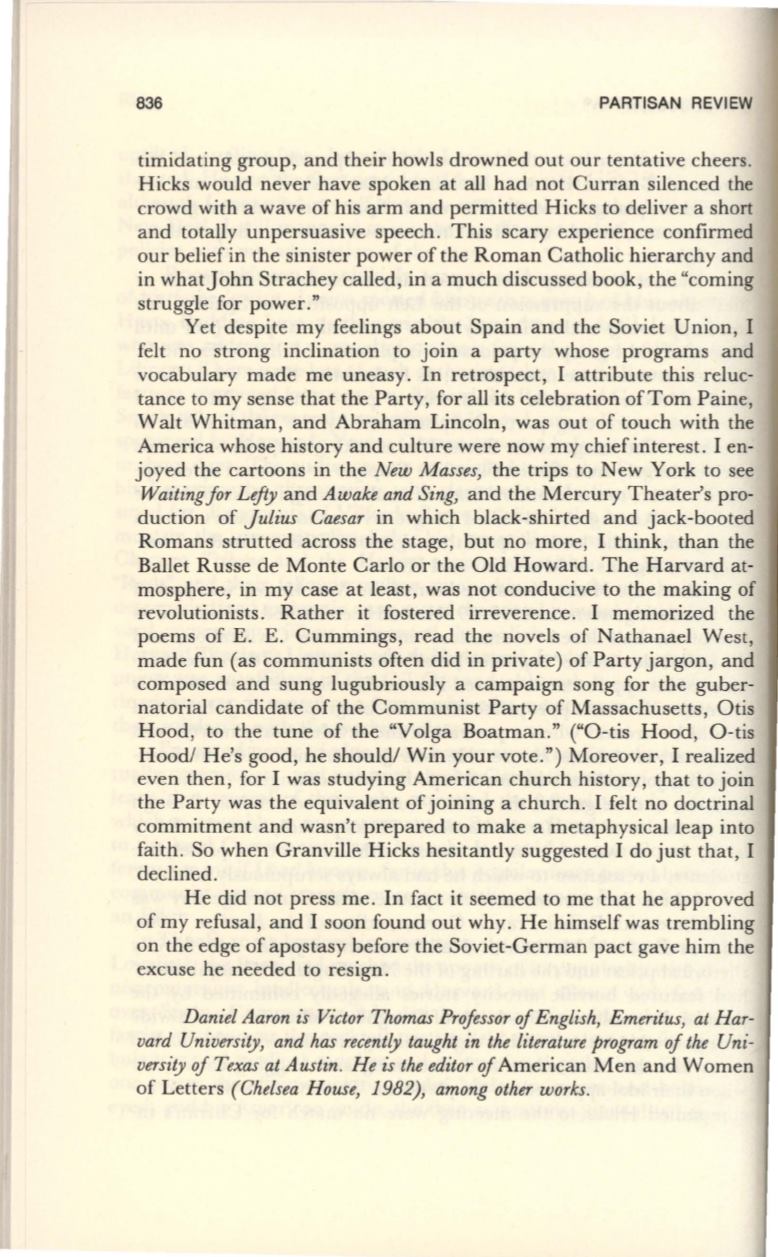
836
PARTISAN REVIEW
timidating group, and their howls drowned out our tentative cheers.
Hicks would never have spoken at all had not Curran silenced the
crowd with a wave of his arm and permitted Hicks to deliver a short
and totally unpersuasive speech. This scary experience confirmed
our belief in the sinister power of the Roman Catholic hierarchy and
in what John Strachey called, in a much discussed book, the "coming
struggle for power."
Yet despite my feelings about Spain and the Soviet Union, I
felt no strong inclination to join a party whose programs and
vocabulary made me uneasy. In retrospect, I attribute this reluc–
tance to my sense that the Party, for all its celebration of Tom Paine,
Walt Whitman, and Abraham Lincoln, was out of touch with the
America whose history and culture were now my chief interest. I en–
joyed the cartoons in the
New Masses,
the trips to New York to see
Waiting for Lefty
and
Awake and Sing,
and the Mercury Theater's pro-
duction of
Julius Caesar
in which black-shirted and jack-booted
Romans strutted across the stage, but no more, I think, than the
Ballet Russe de Monte Carlo or the Old Howard. The Harvard at–
mosphere, in my case at least, was not conducive to the making of
revolutionists. Rather it fostered irreverence. I memorized the
poems of E. E. Cummings, read the novels of Nathanael West,
made fun (as communists often did in private) of Party jargon, and
composed and sung lugubriously a campaign song for the guber–
natorial candidate of the Communist Party of Massachusetts, Otis
Hood , to the tune of the "Volga Boatman." ("O-tis Hood, O-tis
Hood/ He's good, he should/ Win your vote.") Moreover, I realized
even then, for I was studying American church history, that to join
the Party was the equivalent of joining a church. I felt no doctrinal
commitment and wasn't prepared to make a metaphysical leap into
faith. So when Granville Hicks hesitantly suggested I do just that, I
declined.
He did not press me. In fact it seemed to me that he approved
of my refusal, and I soon found out why. He himself was trembling
on the edge of apostasy before the Soviet-German pact gave him the
excuse he needed to resign.
Daniel Aaron is Victor Thomas Professor of English, Emeritus, at Har–
vard University, and has recently taught in the literature program
of
the Uni–
versity of Texas at Austin. He is the editor of
American Men and Women
of Letters
(Chelsea House, 1982), among other works.


